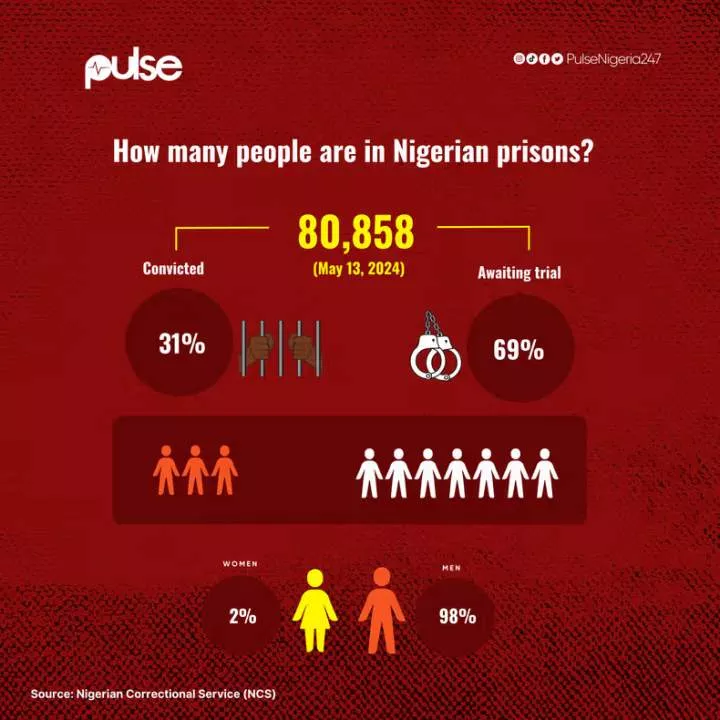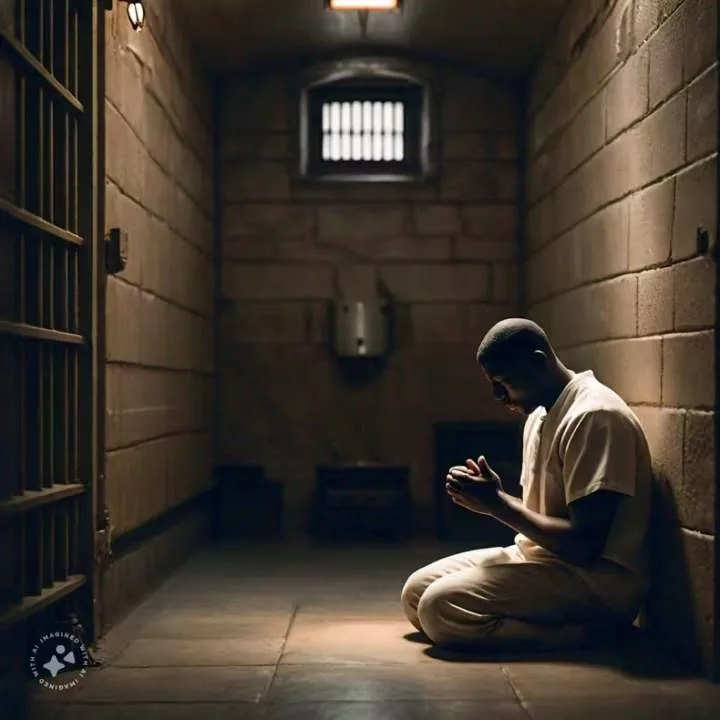5 things I learnt about awaiting trial in Nigerian prisons – I spoke to ex-inmates

Nigeria’s justice system has problems too numerous to count, awaiting trial behind bars is one of the most pressing.
One of my life’s major preoccupations over the past eight months, outside of always complaining about capitalism, inflation and thieving banks, is talking to Nigerians who have been to prison.
The journey started in 2021 when, for the first time, I saw public prison records collated by the Nigerian Correctional Service (NCS) and noticed with some fascination that women made up only 2% of the nationwide prison population – 1,217 inmates out of a total of 64,248 inmates at the time.
“Nigerian women are not committing crimes or what?” I asked my followers on Twitter – they ignored me. But a more disturbing stat soon caught my eye.
Only 30% of the prison population had been found guilty by a court as criminals. The remaining 70% of people locked up in the same prisons were awaiting trial in court, and innocent until proven guilty.

A major concern for me was some of them were in prison for longer than the court would eventually jail them – if they were guilty – while others would be set free when their innocence was established, but only after wasting years of their lives in prison.
Two years later, with 69% of people in prison awaiting trial, I started speaking to people who have gone through Nigeria’s prison system without being convicted of a crime.
I learnt quite a few things from them – a lot were terrible.
1. It’s easy to land in prison because Police is not your friend
A common thread in the stories of the former inmates I spoke to is how easy it is to end up in a Nigerian prison even if you’ve done absolutely nothing wrong. The people most responsible for this trend are police officers whom the inmates accused of various forms of misconduct, starting with illegal arrests.

One of the former inmates was accused of armed robbery even though he was only at the police station to retrieve his motorcycle which officers had seized late at night. A mob of civilians arrested another former inmate while he was minding his business and he ended up spending eight years in prison.
Many of the former inmates also reported being tortured in police custody to give confessional statements to make the prosecution’s job easier in court.
An investigating police officer (IPO) can also delay a trial by repeatedly failing to produce witnesses or evidence in court. Many former inmates reported that their IPOs only showed up on their first court dates and disappeared until their cases were dismissed after years of waiting behind bars.
2. Money is as important inside as it is outside

When people end up in prison, it’s understandable to expect they have no real use for money anymore as they’re the government’s responsibility and should be taken care of. But knowing how well the Nigerian government takes care of anything, you’d be wrong – as many of the inmates confirmed.
Money is more important than ever when you enter a Nigerian prison as it’s central to everything: getting a good night’s sleep on a bed, eating food that’s not primed to kill you, and getting out of trouble. There’s even a prison slang for anything money can solve: plan well.
Most crucially, as an awaiting-trial inmate, money could be the difference between spending a few months in prison and spending years. The former inmates reported that they had to, sometimes, pay the warders to help them get adjournment dates for their cases from the court. Not having money for this could prolong your time in prison.
3. The food is more horrible than you can imagine
Like most of everything about prison, the state of the food is a sore talking point. Not a single one of the former inmates was hyped about the meals.

When the meals are not severely lacking in basic seasonings, salt, pepper and everything that makes food food, they’re exposed to hazardous elements that make them especially dangerous for the inmates to consume.
“If you gave prison food to a dog, it wouldn’t eat, but hunger would make you eat anything,” one of the former inmates told me.
The same inmate also reported the food was sometimes drugged with Largactil. This is a medication given to mentally ill patients to calm them down. The NCS’ Lagos Command spokesperson, Rotimi Oladokun, denied the allegation, but two more former inmates independently corroborated it as part of their experiences in prison.
4. Many Nigerians are stuck in prisons without legal representation

It’s impossible to miss that a significant number of inmates who rot in prison are poor people who can’t afford the resources to navigate the system in the same way, say, a politician who has allegedly embezzled millions of dollars can.
One of the most important resources many inmates lack is a lawyer to represent them in court and hold their hands through Nigeria’s chaotic maze of a justice system. A former inmate I spoke to would have been a free man four years before he was eventually released from prison if only he had a lawyer fully involved in his case.
To drive home the point, all of the former inmates I spoke to wouldn’t have been released at the time they were if their cases had not caught the attention of Headfort Foundation, a non-profit organisation that helps people like them with free legal services.
5. It’s a place to find God
Prison is naturally a hopeless place, so it’s not much of a surprise that many people who go in there look for an outlet that gives them some hope.

Many of the former inmates I spoke to reported that being locked up provided them religious awakening as Christians or Muslims. This is even more likely to happen because inmates have daily worship sessions in their cells.
Some of them were so involved that they became church workers in prison, but one of them said it was also because it was a great way to get access to better food.
What is this all about?
Nigeria’s justice system has problems too numerous to count – this is not a secret and government officials have publicly admitted it many times, even if the solutions aren’t as forthcoming.
One of the most pressing problems is the system is too slow and inefficient in resolving cases. The consequence of this is people’s lives waste away while they’re awaiting trial behind bars. This is one of the most urgent problems to address in Nigeria’s justice system.
Every day this week, you’ll get to read the stories of former inmates in more detail – what their lives were like before they were pulled into the system, the hell of incarceration, and how it impacted their lives post-release.
Tomorrow, you’ll read the story of Segun Esan whose only offence was riding his motorcycle from a painting job at 10 pm, returning home to his pregnant wife and children. He spent the next six years in prison before the lies against him fell apart in court.





